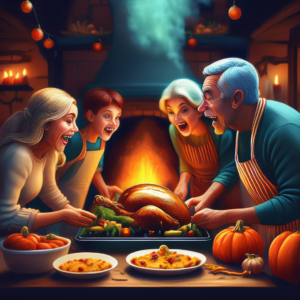Terrifying Thanksgiving Tales
The Other White Meat
The cold November wind bit at Malika’s cheeks as she tightened her scarf around her neck. New York City felt as unwelcoming as ever. She trudged to her shift at the upscale bar where she worked, trying to shake the gnawing loneliness that had taken hold since the semester began. Malika was a college freshman, the daughter of Lebanese immigrants, transplanted from the warmth of Texas to the stark, impersonal streets of Manhattan. Her family didn’t understand Thanksgiving and never really celebrated it, but their meals were always rich with love, overflowing with relatives and dishes that brought everyone together. Malika, however, dismissed Thanksgiving as an empty, capitalist tradition. Yet, she couldn’t help but feel a pang of envy for the stories she overheard from classmates about warm gatherings and feasts.
At work, she kept her head down, polishing glasses and mixing drinks. Ronan, her co-worker, was the opposite of Malika in every way: tall, confident, with an effortless charm that seemed to cloak him in perpetual ease. He exuded wealth—not just in his designer clothes, but in the way he seemed detached from the mundane struggles of life. Malika often wondered why he worked at the bar. He clearly didn’t need the paycheck.
“Doing anything for Thanksgiving?” Ronan asked casually one evening as they closed up the bar.
Malika hesitated. “No. Can’t afford the trip home. My family doesn’t really celebrate it anyway.”
Ronan’s smile widened. “Then you should come with me. My family’s place upstate. It’s a big thing. Food, wine, the works.”
The invitation caught her off guard. They barely knew each other outside of work. She hesitated, nervous about being surrounded by his wealthy family in a remote location. What if they treated her poorly, or worse, what if she was subjected to racist microaggressions miles away from anyone who could help? Against her better judgment, she accepted, the thought of spending the holiday alone in her tiny dorm room felt unbearable.
The drive upstate felt like a journey to another world. Ronan’s sleek car hummed along winding roads lined with skeletal trees. The mansion came into view just as twilight settled, its sprawling estate bathed in the glow of lanterns. Malikas unease deepened at the sight of the opulent home, and her mind churned with critiques as they approached the grand doors. She wondered if she had just signed up for hours of veiled insults about her heritage or awkward silences after someone said something inappropriate. Wealthy, white families like this—weren’t they the keepers of the American myth of Thanksgiving? A story polished into a tale of food and togetherness, conveniently forgetting the genocide and betrayal that defined its origins.
But when they stepped inside, her apprehension faltered. The house was alive with warmth. Children ran underfoot, their laughter mingling with the clatter of pots and pans. The air was thick with the aroma of roasted garlic and caramelized onions. To her surprise, the entire family was actively involved in cooking. They weren’t relying on hired help but bustling in and out of the kitchen themselves, sleeves rolled up and hands dusted with flour. It was… humanizing.
Ronan’s mother greeted Malika with open arms. “Welcome, dear! We’re so happy to have you as a part of our meal. ”
The casual warmth in her tone made Malika relax, if only slightly. Soon, she was drawn into the preparations. She chopped onions, kneaded dough, and stirred thick, aromatic sauces. The family’s lively debates about whether ham or turkey was the superior Thanksgiving centerpiece made her laugh despite herself.
“Turkey is classic,” said Ronan’s cousin, slicing celery for stuffing.
“But it’s so dry,” another chimed in. “Ham’s the way to go.”
“What about those tiny pheasants? There’s so many white meat varieties.” Ronan’s sister joked, winking at Lina. “We’re not picky. We like diversity.”
Malika laughed along, momentarily forgetting her critical musings. The family’s charm and inclusiveness melted her initial apprehension. She didn’t mind when sauces splattered her sleeves or spices dusted her hands. She felt part of something bigger, part of a tradition. Her cup of mulled wine warmed her hands and she drank deep. For the first time in months, she felt like she belonged.
As the evening wore on Malika began to feel a wave of dizziness. She tried to steady herself against the counter, but her vision blurred. A sharp pang of anxiety shot through her as her knees buckled. The last thing she saw was Ronan’s face hovering over hers, his expression calm.
When she awoke, her body felt heavy, her limbs unresponsive. She tried to move, but her arms and legs were bound. Panic surged as she realized she was lying on a cold metal table in the kitchen. The once-welcoming family now surrounded her, their faces beaming with joy.
“What… what’s going on?” Malika’s voice cracked, dry and weak.
Ronan crouched beside her, his tone lighthearted. “You’re the alternative this year. The other white meat.”
Her stomach churned as his words sank in and the children giggled. She struggled against her bonds, but they held firm. The family all moved with eerie precision, brushing her skin with oils and herbs as if she were just another dish to prepare.
“Please,” she begged, tears streaming down her face. “I don’t belong here.”
Ronan’s mother chuckled. “Oh, sweetheart. You’re the highlight of the meal. It wouldn’t be the same without you.”
The oven door creaked open, releasing a wave of heat that made Malika’s skin prickle. The family lifted her as one, their laughter and chatter continuing as if nothing unusual was happening. As she was slid into the oven, the suffocating heat enveloped her. She screamed until her voice gave out, the realization dawning that she would indeed be part of their Thanksgiving—forever.

